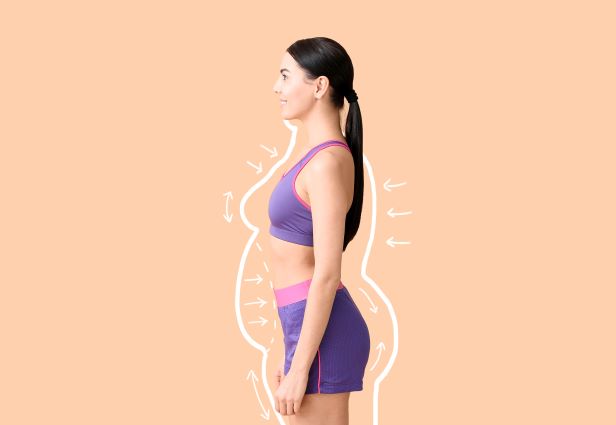
Contents
- Set Realistic Goals
- Increase Physical Activity
- Eat A Balanced Diet
- Cut Out Unhealthy Foods
- Monitor Calorie Intake
- Drink Plenty Of Water
- Avoid Crash Dieting
- Have An Exercise Routine
- Track Progress
- Get Enough Sleep
- Reduce Stress Levels
- Avoid Fad Diets
- Take The Right Supplements
- Don’t Give Up
- Reward Yourself For Achieving Goals
- Conclusion
Last Updated on 3rd February 2023
Are you one of the millions of people desperately trying to lose weight? Have you tried every diet and exercise program known to man but still fail to see any results? If this is the case, then it’s time to take a step back and consider the safest and healthiest way to lose weight. The goal of this article is to provide a comprehensive overview on how to safely and healthily lose weight.
Excess weight has become a major problem in today’s society, with more than two-thirds of adults being either overweight or obese. This can lead to serious health issues such as heart disease, stroke, diabetes, and even certain types of cancer. Fortunately, there are ways to safely and healthily reduce your risk of these illnesses by losing weight in a safe and healthy manner.
In this article, we will explore the best practices for losing weight safely and healthily. We will discuss the importance of eating a balanced diet, getting regular physical activity, setting realistic goals, tracking progress over time, and other tips for maintaining safe and healthy weight loss. With these strategies in mind, you can be sure that you’re taking all the necessary steps towards improving your overall health while achieving your desired bodyweight goals.

Set Realistic Goals
When it comes to losing weight safely and healthily in a sustainable way, setting realistic goals is key. In today’s world, where we are constantly bombarded with extreme dieting plans and fads that promise instant results, it can be difficult to know what is really the best for us. To ensure safe and healthy weight loss, it is essential to set realistic goals that are based on a balanced diet and healthy eating habits.
We are all familiar with the phrase ‘slow and steady wins the race’. This proverb could not be truer when it comes to trying to lose weight safely and healthily. It is important to recognize that any weight loss plan should involve gradual changes in both diet and lifestyle in order to see sustainable results. Setting realistic goals that take into account individual needs, such as medical conditions or personal preferences, will help ensure success in achieving a healthy weight.
Creating an achievable plan that focuses on gradually improving nutrition while also maintaining physical activity helps create an overall healthy lifestyle. Establishing a plan of smaller manageable goals can help keep motivation levels high while also providing markers of progress along the way. Sensible steps like these can help make sure you reach your desired goal without compromising your health or wellbeing in the process.
Increase Physical Activity
Irony is often used to convey a deeper message; this rings true when it comes to the requirement of physical activity for effective weight loss. It is often easier said than done, as activities such as exercising, yoga and sports may prove difficult for many. But the truth is that engaging in physical activity can be one of the most efficient methods of losing body weight and maintaining a healthy lifestyle.
The importance of physical activity in achieving weight loss goals cannot be overemphasized. It not only helps burn calories but also increases your basal metabolic rate (BMR). This means that even when you are resting, your body will continue to burn calories throughout the day. Further, engaging in physical activities like running or cycling provide anaerobic benefits which have an impact on overall fitness and energy levels.
Physical activity should be seen as complementary to calorie intake reduction for successful weight loss. Here are three points of consideration for increased physical activity:
- Start slow: To avoid injury or fatigue, start with low-intensity activities such as walking or light jogging and gradually increase the intensity over time.
- Focus on form: Incorrect posture can cause serious injuries. Ensure any new exercises are done correctly by following instructions from a trainer or by watching videos online.
- Mix it up: Weight loss can become stagnant if one continues to do the same routine every day. Try different exercises to keep your muscles guessing and stay motivated!
In addition to providing short term health benefits, regular exercise has long term implications too; increased physical activity can improve mental wellbeing by reducing stress and anxiety levels while aiding better sleep quality overall. Therefore, integrating physical activity into daily life can ensure improved health outcomes in terms of both weight loss and overall well being.

Eat A Balanced Diet
Achieving weight loss goals can be a daunting task, but with the right approach it can become a rewarding journey. Eating a balanced diet is an essential component for sustained and healthy weight loss.
Healthy foods should form the basis of your meals, such as lean proteins, fresh fruits and vegetables, low-fat dairy products, and whole grains. Avoid processed foods that are high in sugar and unhealthy fats. Additionally, portion control is key to avoid overindulging; eating slowly will enable the body to properly register its satiation levels, preventing overeating. Keeping a food journal is an effective way to monitor your food intake and track progress towards goals.
TIP: Eating more plant-based foods such as nuts, legumes and seeds is an excellent way to cut down on unhealthy fats while still providing important nutrients for energy and overall health. Incorporating these into meals is an easy way to make sure you are getting all the important macronutrients for healthy weight loss.
Cut Out Unhealthy Foods
It is not enough to simply eat a balanced diet for successful and healthy weight loss. It is also important to cut out unhealthy foods from your diet in order to reach your goals. According to the Centers for Disease Control and Prevention, almost 40% of American adults are obese. This statistic emphasizes the importance of focusing on eating habits that support healthy lifestyles and weight loss friendly foods.
Eliminating unhealthy foods from your diet can help you control your body composition by reducing fat and increasing lean muscle mass. In addition, it can help regulate hormones linked with hunger, making it easier to stick with a healthy eating plan in the long run. By cutting out sugary beverages, processed snacks, fried food, and refined carbohydrates, you will be able to focus on consuming fruits, vegetables, lean proteins and whole grains which are essential components of a healthy lifestyle.
In order to maintain a healthy weight and reduce the risk of chronic diseases like heart disease or diabetes, it’s important to ensure that your daily food intake is rich in nutrients that support healthful living but low in calories that can contribute to weight gain. Eating meals made up of nutritious ingredients such as lean proteins, fresh produce and complex carbohydrates can provide lasting energy without packing on extra pounds.

Monitor Calorie Intake
When it comes to losing weight, it can be compared to taking a long journey; you need to prepare for the voyage and make sure you have enough resources to get there. One of the most important resources is monitoring your calorie intake. Doing this will help you lose weight safely and healthily since your body needs a certain amount of calories each day to function properly.
Calories are essential when losing weight as they provide energy, however consuming too many of them can lead to an increase in body fat, resulting in an unhealthy lifestyle. Therefore, it is important to track your calorie intake on a regular basis so that your body has enough energy without putting on extra fat. Additionally, taking note of how much food you eat will help regulate your blood sugar levels which will also aid in losing weight.
Here are some tips that can help you monitor calorie intake:
- Plan out meals for the week ahead and ensure that all dishes are healthy and balanced
- Write down everything consumed during the day – even snacks!
- Keep an eye on portion sizes and don’t go overboard with any one item
- Check nutritional information labels for accurate calorie counts
By following these simple steps, you can ensure that your daily calorie intake is at the optimal level for helping you lose weight safely and healthily.
Drink Plenty Of Water
Metaphor: Drinking water is like pouring oil on the engine of the human body – it keeps all its functions running smoothly.
When it comes to weight loss, drinking plenty of water is essential for achieving results safely and healthily. Staying hydrated helps regulate body temperature, flush out toxins, and improve digestion. It can also help suppress cravings and reduce excess calories consumed through snacking. In this way, adequate water consumption can be a helpful tool in developing a successful weight loss plan beyond fad diets.
Maintaining proper hydration levels is especially important for people trying to lose weight safely and healthily. According to clinical nutrition studies, dehydration can cause an increase in stress hormones which can lead to overeating as well as decreased physical activity due to fatigue or muscle cramps. Furthermore, being dehydrated will affect your body mass index (BMI). Therefore, drinking sufficient amounts of water should be incorporated into any weight-loss strategy when aiming for long-term success.
Water intake should always be monitored closely while taking into account individual differences such as age, gender, activity level and climate factors that may affect daily needs. Health professionals recommend that adults drink between 6-8 glasses of fluids per day; this includes both plain water and other non-alcoholic beverages such as tea or coffee without sugar or creamers added. By adding more water into your diet you will soon begin to reap the benefits of healthier living habits associated with successful weight loss plans.
Avoid Crash Dieting
Crash dieting is an extreme approach to shedding pounds quickly and has been known to cause severe health problems, even death in some cases. It involves reducing caloric intake drastically, often to below the recommended daily allowance (RDA). This results in a rapid reduction in body weight that is unsustainable. With crash dieting, individuals may not only be depriving themselves of essential nutrients but also of the opportunity for successful and healthy weight loss.
The risks associated with crash diets are too great to ignore. These diets can cause long-term damage to health and lead to eating disorders such as anorexia or bulimia. Studies have shown that crash diets are ineffective at maintaining weight loss over time and can actually make it harder to achieve steady weight loss in the future. Furthermore, without proper clinical nutrition guidance, there is no guarantee that individuals will be getting the necessary nutrients needed for healthy functioning of their bodies.
Therefore, when aiming for a healthy weight it is important to focus on lifestyle changes rather than fad diets or other extreme approaches. Eating well balanced meals regularly, engaging in physical activity and avoiding unhealthy habits such as excessive alcohol consumption will help create an environment conducive to sustainable weight loss over time. And if seeking professional advice it is important to look out for certified nutritionists who understand the science behind successful and safe weight loss.
Have An Exercise Routine
Weight gain is often compared to a journey. It starts with taking one step at a time, and that is the same when it comes to losing weight safely and healthily. A great way to begin this journey is by having an exercise routine that works for the individual’s lifestyle.
Regular physical activity can help burn calories and prevent gaining weight in the first place. Strength training twice a week can also be beneficial, as it helps build muscle which increases metabolism and helps keep fat off in the long run. In addition, eating healthy fats can also support weight loss by keeping one full for longer periods of time, which keeps cravings at bay. As such, creating an exercise plan that includes both aerobic exercises and strength training along with consuming healthy fats will be key for creating a successful weight loss plan.
It’s important to remember that dedicating time to an exercise routine should not be seen as a chore but rather an opportunity to take charge of one’s health and wellbeing. Even small changes like walking around the block or taking stairs instead of elevators can make a difference over time if done on a regular basis. Regular physical activity along with healthy eating habits are essential components of any successful weight loss program – not just for shedding pounds but also for maintaining overall good health in the long run.
Track Progress
Tracking progress is an essential component of any successful weight loss plan. In order to gauge the effectiveness of one’s efforts, it is important to establish weight loss goals and use a variety of methods to assess body composition. Establishing these goals is key in monitoring progress over time.
When tracking progress, it is important to not only look at how much weight one has lost, but also other factors such as food groups consumed, daily routine and overall health outcomes. For example, tracking macronutrients can help identify which food groups are contributing to weight gain or loss, while combining this information with daily physical activity levels can be beneficial in determining the ideal caloric intake for optimal weight loss results. Additionally, taking body composition measurements can help provide insight into changes in fat mass versus lean mass. This data can then be used to adjust one’s diet and exercise routine accordingly.
Regularly assessing progress will allow one to make tweaks to their weight loss plan as needed and ensure that they are on track towards achieving their desired outcome. Keeping a journal or spreadsheet of all measurements taken throughout the process may prove useful in determining which strategies work best for them and what adjustments need to be made over time.
Get Enough Sleep
Adequate sleep is an essential component of a healthy lifestyle, and can be beneficial for those seeking to lose weight quickly. Sleep deprivation has been linked to numerous health problems, such as impaired metabolism and decreased physical performance. Clinical nutrition research suggests that 7-9 hours per night is the optimal amount of sleep for those trying to maintain a healthier lifestyle.
In addition to the health benefits associated with getting enough sleep, studies have also shown that it can help with weight control. Lack of adequate rest has been found to disrupt hormones that regulate hunger and appetite by increasing levels of ghrelin, which stimulates hunger, and decreasing leptin, which signals fullness. Furthermore, insufficient sleep can lead to reduced muscle mass and increased fat storage in the body. This makes it more difficult for individuals to lose weight effectively. Thus, getting enough sleep is an important factor for anyone looking to achieve their desired results in a safe and healthy manner.
Reduce Stress Levels
Reducing stress levels is an important part of maintaining a healthy lifestyle. It can also be beneficial for those looking to lose weight fast. Stress can lead to increased blood pressure and other cardiometabolic risk factors, which can affect your heart health. Therefore, it is important to identify and address sources of stress in order to maintain a healthy lifestyle.
There are many resources available to help reduce stress levels such as counseling services and support groups provided by the Department of Human Services or online resources that promote relaxation techniques like meditation and mindfulness. Exercise has also been linked to improved mental health, so it can be beneficial for reducing stress levels as well. Furthermore, engaging in activities you enjoy and taking time for yourself can be helpful for managing stress levels.
It is important to take care of your mental health when trying to achieve a healthy lifestyle. Identifying sources of stress and finding ways to manage them can help improve overall wellbeing as well as reduce cardiometabolic risk factors that could potentially affect heart health. Taking steps towards reducing stress levels should be an essential part of any weight-loss journey or overall lifestyle change.
Avoid Fad Diets
When attempting to lose weight in a healthy and safe manner, it is essential to avoid fad diets. Fad diets are typically characterized by one or more of the following: extreme caloric restriction, elimination of one or more food groups, and promotion of unproven supplements. Such drastic measures can lead to nutrient deficiencies and other negative health consequences.
It is far better to focus on consuming whole foods that are rich in essential nutrients. Eating a balanced diet centered around fresh fruits and vegetables, lean proteins, healthy fats, and whole grains will help ensure adequate intake of essential vitamins and minerals while allowing for the occasional indulgence. Additionally, avoiding overeating and limiting added sugars are important components of a healthy weight-loss program. Intermittent fasting can also be beneficial when done correctly; however, it may not be suitable for all individuals.
The key to sustainable weight loss is creating an eating plan that involves nourishing foods while still allowing flexibility within reason. Gradual changes implemented over time are much easier to maintain than drastic dietary overhauls that lack essential nutrients. Furthermore, long-term adherence increases the likelihood of long-term success in achieving healthy body weight goals.
Take The Right Supplements
Supplements are an important part of a healthy weight loss plan. Taking the right supplements can ensure that any dieter is getting all the essential vitamins, minerals and other nutrients needed to maintain a healthy body and lifestyle. This is especially important for those who are trying to lose weight safely and healthily, as it can help them avoid any nutrient deficiencies that could lead to further medical complications down the line. In order to get the most out of their supplementation regimen, one should:
- Eat a balanced diet: Eating lean meats, such as chicken or fish, while incorporating fruits and vegetables, whole grains and healthy fats like olive oil into their meals will provide a good foundation for anyone wanting to lose weight.
- Exercise regularly: Staying active helps to speed up metabolism and burn more calories in less time. It also helps reduce the risk of developing heart disease.
- Take quality supplements: Quality supplements can help promote overall health by ensuring adequate intake of all necessary nutrients. Sweet potatoes, for example, provide additional potassium which helps regulate fluid balance in the body and is essential for muscle contraction.
It’s important to remember that supplementing with pills alone won’t guarantee weight loss results; it must be done in combination with regular exercise and eating a balanced diet. With this approach, you’ll be able to achieve your desired goal without putting your health at risk. As they say ‘Rome wasn’t built in a day’, so take your time and stay consistent with your efforts if you want to see successful results over time!
Don’t Give Up
When it comes to losing weight healthily and safely, the process can be daunting. It requires dedication and perseverance to make it through to the end. It is important not to give up. There are a few key points that can help you make it easier:
1) Determine how many calories you need in order to achieve your goal – this will help you create a successful weight loss plan.
2) Cut out processed foods as much as possible – these are usually full of empty calories that offer no nutritional value.
3) Stay hydrated – drinking water throughout the day helps you lose weight faster and keep your body in balance.
As a doctor, I recommend creating structure and following through with it; make sure to stick with your weight loss plan, as this will help maintain focus on achieving your goals while keeping track of progress made along the way. Additionally, don’t forget to get enough rest; this aids in allowing your body to recover properly from workouts and helps reduce stress levels which can have an effect on weight-gain.
It is essential to stay motivated throughout this process; celebrate small successes but also remember to adjust plans if needed, as life can throw unexpected curveballs at times. Ultimately, developing healthy eating habits, exercise routines, and proper sleep patterns are all key components in achieving success when it comes to losing weight safely and healthily.
Reward Yourself For Achieving Goals
The pursuit of better health is not a mere goal, it is a lifelong commitment. Losing weight safely and healthily requires dedication and motivation, which often come in the form of rewards. Rewarding oneself for achieving goals can help to keep people motivated and on track to reach their desired outcomes.
Science-backed tips suggest that one way to reward oneself for reaching certain milestones is by indulging in a small treat such as a glass of fruit juice or other non-alcoholic beverage. As with any dietary decisions, it is important to consult with a registered dietitian before making any changes to your food choices. They can provide personalized advice on how best to reach your goals in the safest manner possible.
In addition, there are many other ways that one can reward themselves for reaching their goals. For example, taking time out of each day for relaxation activities such as reading, going for a walk or listening to music are all great ideas that could help keep an individual motivated while also helping them meet their desired outcome. Ultimately, finding fun and creative ways to reward yourself can be an effective way to stay motivated while working towards better health.
Conclusion
Achieving a healthy body weight is a long-term process that requires effort and dedication. The journey of losing weight safely and healthily may be gruelling, however it can be rewarding to see changes in one’s appearance and physical performance. To reach a healthy body weight, set realistic goals, increase physical activity, eat a balanced diet, cut out unhealthy foods, monitor calorie intake, avoid fad diets, take the right supplements and don’t give up.
Symbolically speaking, losing weight can be likened to climbing a mountain. It is an arduous trek up the peak that requires perseverance in order to make it to the summit. Along the way there will be roadblocks that may seem insurmountable at first but with strength and determination they can be conquered. Once at the top of the mountain one can admire their accomplishment and bask in its glory until ready for another challenge.
Ultimately, it is important to keep sight of personal goals when embarking on this journey and remember that every step forward brings one closer to achieving them. With patience and hard work success will come; like a beacon of light shining through the fog of uncertainty during this difficult climb so too will come clarity on how best to lose weight safely and healthily.





































